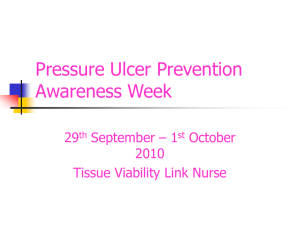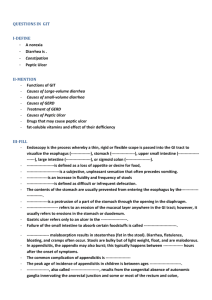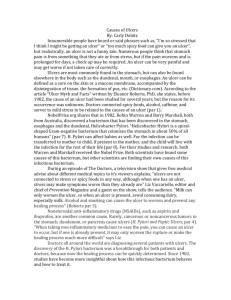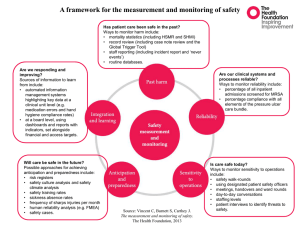awais chohan
advertisement
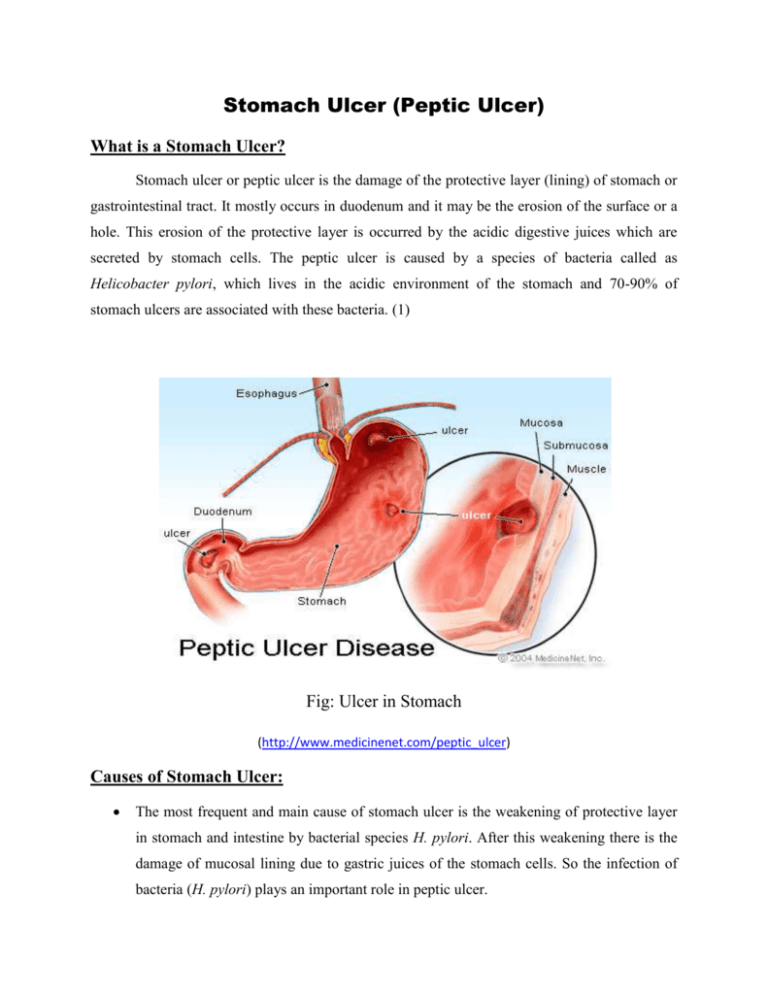
Stomach Ulcer (Peptic Ulcer) What is a Stomach Ulcer? Stomach ulcer or peptic ulcer is the damage of the protective layer (lining) of stomach or gastrointestinal tract. It mostly occurs in duodenum and it may be the erosion of the surface or a hole. This erosion of the protective layer is occurred by the acidic digestive juices which are secreted by stomach cells. The peptic ulcer is caused by a species of bacteria called as Helicobacter pylori, which lives in the acidic environment of the stomach and 70-90% of stomach ulcers are associated with these bacteria. (1) Fig: Ulcer in Stomach (http://www.medicinenet.com/peptic_ulcer) Causes of Stomach Ulcer: The most frequent and main cause of stomach ulcer is the weakening of protective layer in stomach and intestine by bacterial species H. pylori. After this weakening there is the damage of mucosal lining due to gastric juices of the stomach cells. So the infection of bacteria (H. pylori) plays an important role in peptic ulcer. These bacteria may be transmitted from person to person through contaminated water and food and cause stomach ulcer. Stomach ulcer may be caused by the injury of mucosal lining or weakening of mucous defense system. Excessive secretion of Hydrochloric Acid due to genetic problem or psychological stress may also cause peptic ulcer. Excessive use of anti-inflammatory medicines such as Aspirin is also a big cause of stomach ulcer. Peptic ulcer is also caused by smoking and frequent use of alcoholic products.(3) (www.pepticulcersymptoms.org) Symptoms: Abdominal pain with a burning Pain after 2 - 3 hours of eating Worse pain by an empty stomach especially at nighttime Pain is relieved by antacids or milk Heartburn Indigestion Belching Nausea Vomiting Poor appetite Weight loss(3) Diagnosis: A thorough checkup of abdomen and chest to look for any sign of bleeding, this will help to check the extent or the level of disease. Upper gastrointestinal (GI) series: In this test after taking a chalky liquid called barium a series of X-rays is performed to check for stomach ulcer. Endoscopy: In this the ulcer is diagnosed via a thin tube having a small camera on upper end and this tube is inserted in the stomach and duodenum of patient to see the ulcer. With this endoscope we can also take the sample of tissue to check for bacterial infection. Blood test may also be done to check for the antibodies against H. pylori and this may (www.umm.edu/patiented/articles/how_peptic_ulcers_diagnosed) also help in diagnosis.(2) Treatment: The main goals for the treatment of peptic ulcer are the eradication of the symptoms of ulcer and the cure of this ulcer from root level by eradicating the real cause of peptic ulcer. It also includes the future prevention from this disease. No doubt, that medication is the main treatment for peptic ulcer. Different kinds of medicines are given for this disease according to the cause of stomach ulcer to cure this disease. We may need surgery to cure this disease in very severe cases, when there is great infection and damage by H. pylori. (4) There are different methods to treat this peptic ulcer. 1- Change Lifestyle: Eat fruits and vegetables and the diet rich in fibers. Eat food that contains Flavonoids like apples and use onion, garlic and tea because these things inhibit the growth of H. pylori. Quit smoking and the use of alcoholic products. Do not eat spicy foods.(4) 2- Medication: “Triple therapy” is used in order to eradicate the peptic ulcer. One medicine is used as proton pump inhibitors which reduce the production of acid. 2nd medicine is used against the bacteria H. pylori which act as an antibiotic. 3rd medicine is used as the recovery medicine to recover the inner mucosal lining of stomach and intestine.(3) 3- Antacids: These are not actually the medicines but are the relievers against heartburn, chest burn and indigestion. They include: Aluminum hydroxide Magnesium hydroxide Aluminum hydroxide and magnesium hydroxide Calcium carbonate Sodium bicarbonate (4) 4- H2- Blockers: They help to reduce the gastric acid production. These include: Cimetidine Ranitidine Nizatidine Famotidine If all these procedures do not give good results and still there is severe condition and bleeding is present from the ulcer. Then eventually the surgery is the last cure. Only 30% of the patients of peptic ulcer require surgery to cure them. (4) References: 1- http://www.mamashealth.com/stomach.asp 2- http://www.medicinenet.com/peptic_ulcer 3http://www.contactpakistan.com/Communitylibrary/general/health/general/article 15.htm 4- http://www.umm.edu/altmed/articles/peptic-ulcer-000125.htm
